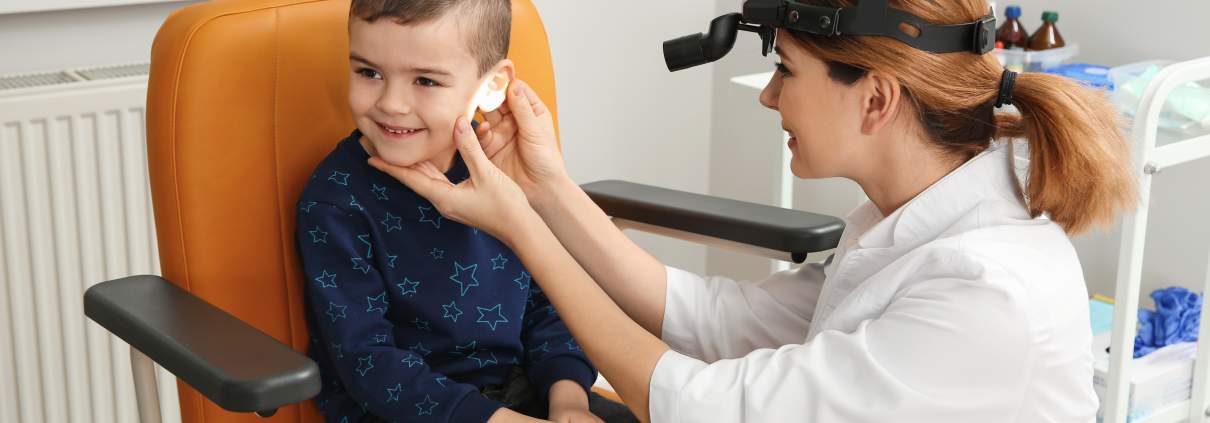Are You Concerned About Your Child’s Hearing?
Are You Concerned About Your Child’s Hearing?
If you are, you’re not alone. You are not the only one who is concerned about their child’s hearing. The health and well-being of our kids are a priority, which includes looking out for any signs or symptoms that may lead to potential hearing loss.
Early detection plays an important role in helping prevent further issues so if you notice something that’s off, don’t wait until it’s too late. Learn the warning signs and get your child tested if you suspect any issues with their hearing.
What Are the Warning Signs of Hearing Loss?
Hearing loss is a reality at any age and it can be hard to detect in young children. It’s not something you should take lightly so It’s important to be aware of the warning signs that could indicate an issue with your child’s hearing. These warning signs may include:
- Repeating what others say without understanding it
- Not responding to being called
- Not hearing both soft sounds and loud noises
- Misunderstanding words in a noisy environment or a crowd
- Asking you or other kids to speak more slowly, clearly, and loudly
- Losing interest in joining social groups and interacting with others
Paying attention to these symptoms may help ensure your child receives timely attention and treatment as soon as possible.
What Are Some Behaviors of a Child With Hearing Loss?
Your audiologist needs to be able to check your child as soon as possible. Not only to treat the condition properly but also to help your child avoid any behavioral issues later on.
Children with hearing loss are at great risk of developing behavioral problems later on. They may have difficulty following directions, delayed speech development, attention deficit hyperactivity disorder (ADHD), increased aggression, and emotional outbursts. Early intervention is crucial for helping these children manage their condition which in turn can help prevent long-term problems from occurring.
Can I Test My Child’s Hearing at Home?
These are just a few of the observation tests that you can use at home. Please note your observations down so you can share them with your audiologist. They will help as your child undergoes the more comprehensive tests at your audiologist.
However, we understand your worries and there are some home observation tests that you can do. They are a great way to help you understand your child’s hearing condition.
- The Whisper or Soft Voice Test – Stand behind your child at arm’s length and whisper to her/him.
- The Paper Rub Test – Stand behind your child and rub a piece of paper between your fingers about 2-3 inches away from each ear. noise is okay, but keep it to a minimum as it may impact results.
- Listening Test – This is a series of observation tests that you can do together as parents. One parent will stand in front of the child making the observations while the other parent will stand behind, at certain distances, performing both loud and soft sounds.
- Distraction Test – Similar to the Listening Test, but with the parent in the front drawing the child’s attention. The parent behind the child (a little distance away) will then have high and low sounds, as well as soft and loud volumes to distract the child.
Make sure you record any observations on their hearing, as they could prove invaluable during more comprehensive testing with an audiologist later on.
Can Earwax Cause Hearing Loss?
In a nutshell, yes. Earwax buildup can cause conductive hearing loss, a condition where sound cannot pass from the outer and middle ear into the inner ear. If not treated by an audiologist, it can lead to further issues with irritability and even more permanent damage to one’s ability to hear. Fortunately, it must be addressed by an audiologist to prevent further irritation or permanent hearing loss.
Visit Professional Audiological Services To Be Sure
A child’s hearing is critical for her/his development, so if something doesn’t sound right – don’t wait. Early diagnosis and treatment of hearing loss can make a huge difference in your child’s life. So visit your audiologist and have your child tested as soon as possible. A full assessment of her/his situation would help in finding the right professional audiological solutions that would best fit your child.
###
Resources:
Centers for Disease Control and Prevention
Mayo Clinic
National Library of Medicine
WebMD
Mountain Ear, Nose & Throat Associates P.A.
Nemour’s Children’s Health
London School of Hygiene & Tropical Medicine
American Speech-Language-Hearing Association
Playbutton
(I’m using the intro here, it’s such good copy.)
Ultimate Ears
Francis Audiology
Pacifica Audiology
Sensaphonics
Are custom molded in ear monitors worth it?
Healthy Hearing (Consumer Website/Clinic Directory)
Forbes Health (News/Healthcare Media)
American Speech-Learning-Hearing Association (Association of Medical Professionals)
Advanced Hearing Care (Audiology Clinic/Competitor)
Beltone Electronics (Hearing Care Store/Supplier)
Eastern Carolina ENT Head & Neck Surgey (Audiology – ENT Clinic/Competitor)
National Library of Medicine (News/ Medical Journal/Health Publication)
Tinnitus: surgical treatment | J W House, D E Brackmann
Therapeutic role of Vitamin B12 in patients of chronic tinnitus: A pilot study | Charu Singh, Rahul Kawatra, Jaya Gupta, Vishnu Awasthi, and Homnath Dungana
The role of vitamin D in subjective tinnitus—A case-control study
MedicineNet, Inc., by WebMD (News/Healthcare Media)



